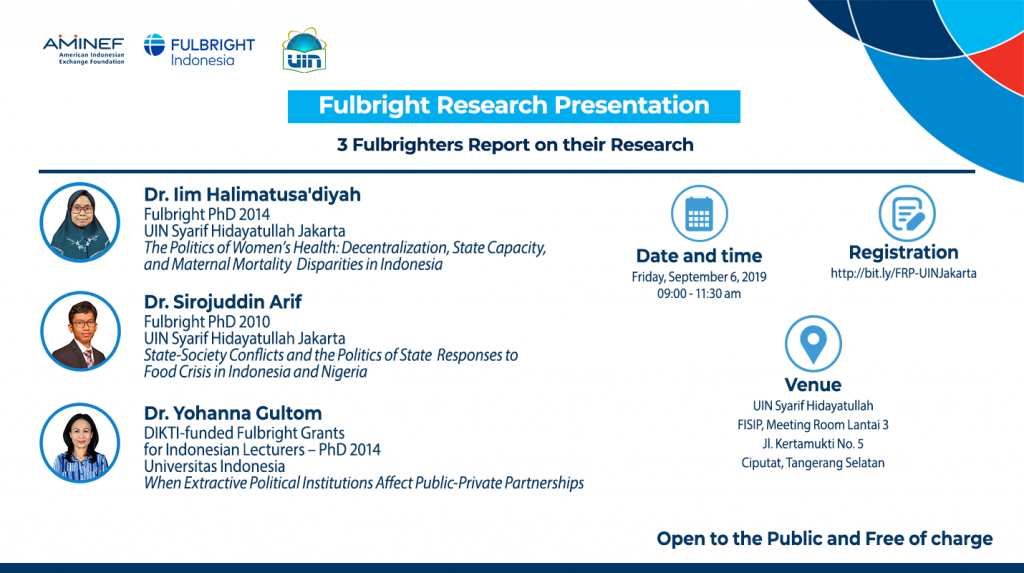
AMINEF and UIN Syarif Hidayatullah Jakarta invite you to a Fulbright Research Presentation (FRP) on Sociology, Political Science, and Public Policy on September 6, 2019 at UIN Syarif Hidayatullah Jakarta.
There will be three presentations by the following Fulbrighters whose research summary and brief profile can be found in the paragraphs below:
1. Dr. Iim Halimatusa’diyah who received her doctorate degree in Sociology at the Iowa State University under the 2014 Fulbright Doctoral Degree (PhD) Scholarship. Her research interests analyze the relationship between gender, religion, ethnicity, health and development.
2. Dr. Yohanna Gultom who received her doctorate degree in Public Policy at Oregon State University under the 2014 DIKTI-funded Fulbright Grants for Indonesian Lecturers – PhD scholarship.
3. Dr. Sirojuddin Arif who received his doctorate degree in in Political Science at Northern Illinois University under the 2010 Fulbright Doctoral Degree (PhD) Scholarship. His research interests focus broadly on the political economy of development, poverty reduction, social policy, and religion and politics.
Research summary and brief profile of the presenters are as follows:
1. Dr. Iim Halimatusa’diyah
Her dissertation “The politics of women’s health: Decentralization, state capacity, and maternal mortality disparities in Indonesia” explored the causes of maternal mortality rate disparities between and within countries. Many studies on maternal mortality have stressed socio-economic development as the primary cause of these disparities while overlooking the influence of political and institutional factors such as state capacity and decentralization. To fill in this gap, this paper examined the impact of decentralization and state capacity on maternal mortality. The findings indicated that local state formation did affect the development of state capacity at the sub-national level. Therefore, improvements in local state capacity, especially for new districts, will be necessary for the country to minimize the inter-regional gaps in health outcomes like maternal mortality.
She is a lecturer at the Department of Sociology, UIN Syarif Hidayatullah Jakarta. She received her master’s degree in Sociology from the University of Birmingham, UK and bachelor’s degree in Education from UIN Syarif Hidayatullah Jakarta.
2. Dr. Yohanna Gultom
One of her dissertation essays entitled “When Extractive Political Institutions Affect Public-Private Partnerships: Empirical Evidence from Indonesia’s Independent Power Producers Under Two Political Regimes” assesses whether, under the extractive political institutions, political motives undermine the efficiency motives in promoting public-private partnerships (PPPs) for the provision and delivery of infrastructure. Taking the case of the electricity sector in Indonesia, where a political regime shift has impacted the contractual arrangement of independent power producers (IPPs), this paper examines the economic performance of IPPs endorsed by the two political regimes, i.e. the authoritarian Soeharto regime and the democratic government. This study provides the first substantial analysis of how the political economy background of public-private partnerships is correlated with their comparative performance.
She is a lecturer at Universitas Indonesia. She received her master’s degree in International Affairs from the Columbia University, another master’s degree in Philosophy at Erasmus University Rotterdam, and bachelor’s degree in Sociology from Universitas Indonesia.
3. Dr. Sirojuddin Arif
His dissertation “The Distributive Impacts of State-Society Conflicts: Evidence from Indonesia’s and Nigeria’s Responses to Food Crisis” analyzes the political origins of agricultural policies and their distributional outcomes in Indonesia and Nigeria. Focusing on the variation in state-responses to the food crisis that hit the two countries in the 1960s and 1970s, it aims to explain the condition under which the state is likely to pursue rural-biased policies. Despite the similarity of political and economic conditions of the two countries, why did they respond differently to the food crisis? Why did Indonesia pursue rural-biased policies, while Nigeria, on the contrary, urban-biased ones? Drawing on the state-in-society approach to political explanation, this study argues that the salient form of popular grievances and how the political articulation of these grievances shaped state-society relations do matter for government policy responses. In the event of food crisis, the threat of rural disturbances will lead governments to pursue rural-biased policies while the threat of urban radicalism will lead governments to implement, on the contrary, urban-biased policies. Thus, while highlighting the consequential power of political mobilization, the finding of this study also shows that the economic effect of the security threats caused by mass mobilization will be dependent on the type of social forces involved and the economic structure of the society in which the mobilization takes place. This requires social and political activists to consider the relevance of the social basis of their organization to the political-economic structure of the society.
He received his master’s degree in Social Anthropology at the University of Oxford, another master’s degree in Interdisciplinary Islamic Studies at UIN Syarif Hidayatullah Jakarta and bachelor’s degree in Anthropology at Gadjah Mada University.
All Fulbright Research Presentations are open to the public and free of charge. Registration: http://bit.ly/FRP-UINJakarta
Last Updated: Sep 4, 2019 @ 5:07 pm




